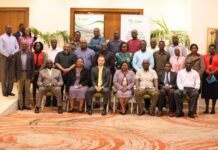The Agricultural Transformation Programme (ATP) is a major $6.6 billion project intended to ensure rapid structural transformation of the agricultural sector in the Democratic Republic of the Congo (DRC) through a targeted, integrated investment approach. One of the largest countries in Africa, it has a cultivated area of more than 80 million hectares, of which only 10% is currently cultivated.
Initially outlined last year, the 2025 edition of Macfrut marked the presentation of the next step during a press conference at the Democratic Republic of the Congo’s hall: the launch of the operational phase with the financing of the first two projects worth over $440 million by the African Development Bank. Both projects are aimed at increasing national productivity in several value chains, ranging from fruit and vegetables (vegetables and beans) to agriculture in general (mainly cassava, palm oil, maize and soya). The aim is to reduce food imports by 60% over the next five years, which are estimated at around $6.5 billion a year. With a population of approximately 100 million, the DRC is heavily reliant on food imports, which account for the majority of its consumption, and therefore needs to develop its own agricultural production.
In this context, the general objective is to ensure that ‘the soil prevails over the subsoil’, as the DRC authorities have effectively defined it. It is a new paradigm of national economic development that shifts the focus from mineral resources (subsoil) to agricultural development, with the fruit and vegetable sector playing a central role (soil). In this scenario, the acquisition of technology and equipment is a critical factor in developing agricultural skills and creating an effective value chain. This is why there are now so many opportunities available for Italian companies, which have always been at the forefront of technological advances in this sector. The Mattei Plan has strongly supported this process in Africa, with the involvement in the DRC of ANAPEX (National Agency for the Promotion of Exports), the Italian Embassy and ICE-Italian Trade Agency.
This first phase of the project will cover nine provinces in the DRC: Kongo Central, Kwango, Maï Ndombe, Kasaï Oriental, Lomami, Sud Kivu, Tshopo, Sud-Ubangi and Nord Ubangi.
The projects involve a number of initiatives, including the development of 5,000 hectares of rice-growing areas, the construction of infrastructure for five research centres (Maï Ndombe, Kwilu, Yangambi, Boteka, Nganda-Jika), the installation of solar energy systems to supply drinking water, the creation of 10 community centres for those seeking employment in the agricultural sector, and the construction of five centres to promote youth entrepreneurship in the agri-food sector.
The key to development lies in the acquisition of technologies that will drive innovation in agriculture in several areas: mechanised agriculture, irrigation, refrigeration and drying technologies, technologies for post-harvest processing of fruit and vegetables, and logistics, transportation and marketing technologies for agricultural products, vegetables and fruits.
Fabrizio Lobasso, Central Director for the Economic Internationalisation of the Italian Ministry of Foreign Affairs, expressed great enthusiasm for the meeting: “We are very pleased to be here together: the Democratic Republic of the Congo is a friendly country that holds a special place in our hearts. The plan being presented by the DRC is a very important project, and Italy is significantly involved in this initiative. The Congolese effort fully aligns with the principle of a ‘partnership of equals’ that defines our relationship and was clearly reaffirmed in the Mattei Plan. Above all, the Plan is a way to engage in the relationship, to take action and to reflect together on possible future initiatives. Agribusiness, food, fruit and vegetables, represent the most immediate and vital link for creating new partnership opportunities.”
Professor Roger Ntoto from the Department of Agricultural Economics at the University of Kinshasa reiterated the goals of the Mattei Plan: “The Mattei Plan calls for a partnership with African countries through the involvement of Italian companies that can help us develop agriculture. The Democratic Republic of the Congo has enormous potential in the fruit and vegetables sector. Key objectives include formulating agricultural policies and promoting youth employment. And our shared goal, naturally, is to support DRC’s democratic development together with a country we consider both a friend and a brother: Italy.”
‘At present, the DRC offers one of Central Africa’s greatest opportunities for Italian investment in the agricultural and agro-industrial sectors, particularly for Italian technology (agricultural machines, processing units and packaging) that can meet the needs of the Congolese market, which is both dynamic and under-equipped,’ explains Mike Tambwe, CEO of ANAPEX. ‘Macfrut 2025 will take place in a favourable environment for increased cooperation between Africa and Europe, thanks in large part to the Mattei Plan for Africa, which promotes equitable partnerships in key areas of sustainable development.’
‘I am very familiar with the DRC as I have visited it on three occasions in the last two years, as part of Macfrut’s trade fair missions,’ explains Renzo Piraccini, President of Macfrut. ‘This country has huge potential and is undergoing a process of agricultural transformation that is currently affecting the fruit and vegetable sector. This programme offers significant opportunities for Italian companies to set up joint ventures with Congolese operators, which are also being encouraged by the Mattei Plan. At last year’s Macfrut, the overall Agricultural Transformation Programme was presented. This year’s edition marks the start of the project’s operational phase, with the first two tenders.’









